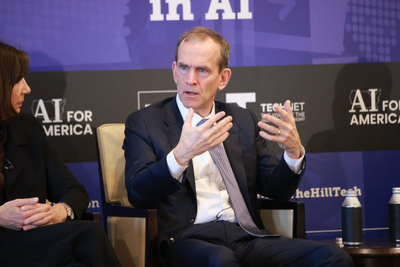
Kent Walker, Google's president of global affairs, said Wednesday that global alignment on how to govern artificial intelligence (AI) has gone “surprisingly well” as regulators race to keep up with the rapidly advancing technology.
"I would say they are going surprisingly well, actually. We’ve seen a great deal of alignment around those core principles,” Walker said at an Advancing America’s Leadership in AI panel hosted by The Hill.
He said there is “a lot of positive alignment" as lawmakers in Europe push forward with new AI rules, and in the U.S. through the release of the White House executive order on AI and the NIST risk management framework.
“But we have to remember, this technology won’t take care of itself. We do need to make sure we have a concerted effort to move forward,” Walker said.
Walker spoke on the panel alongside Michael Kratsios, managing director of Scale AI and former U.S. chief technology officer; Rahul Sood, chief product officer at Pindrop; and Kerry McLean, executive vice president, general counsel, and corporate secretary at Intuit.
At the same time, as U.S. lawmakers consider regulation, Walker said they need to create a “regulatory framework that is enabling,” especially as China moves ahead with investments in large language models.
He said there needs to be a “supportive structure” that “strikes a balance” with copyright law, works out issues around privacy concerns, and avoids a fragmented system of state laws.
To date, the U.S. has not passed any federal AI laws, but the House and Senate have formed bipartisan working groups to consider regulations.
“It's not about moving very fast, it's about moving thoughtfully because I think you can very easily overregulate, or you might end up, you know, stifling the innovation that is needed,” Sood said during the event.
Sood said there have been a lot of draft bills and discussion but not “enough of a framework that will ensure safe use of AI.”
“I think we need to get to the state where, just like today, when you go to a food store ... you pick up an apple, and you know the apple is safe,” Sood said. “I think an average citizen needs to feel the same level of safety or confidence or trust in any piece of information they're accessing. And for us to get there, I think there is a big role that, you know, policy and regulations has to play.”
Kratsios said it is important regulations are case specific rather than technology specific, which can create ineffective “one-size-fits-all” policies.
“If someone does a nefarious activity using a knife, for example, we're not regulating knives; we’re regulating the activity that you did with a knife,” Kratsios said. “And I think that the same goes with artificial intelligence.”
Under the Biden administration, federal agencies — including the Federal Trade Commission (FTC), the Civil Rights Division of the Department of Justice, the Consumer Financial Protection Bureau and the Equal Employment Opportunity Commission — have vowed to enforce existing laws that aim to uphold fairness and justice as AI is increasingly used in lieu of specific laws surrounding AI.
Walker said policies should be working to fill in gaps rather than starting from scratch.
“We don't really need an AI agency so much as we need every agency to be an AI agency and to understand the new implications in their area and understand where existing laws or regulations may fall short,” Walker said.